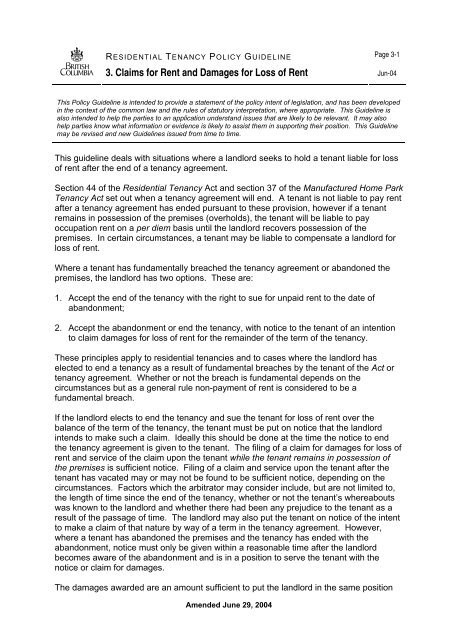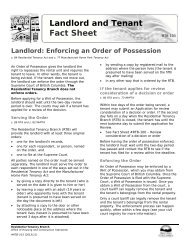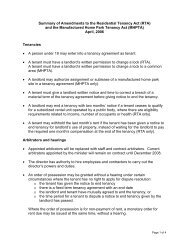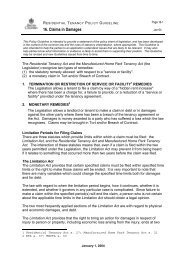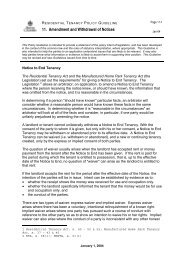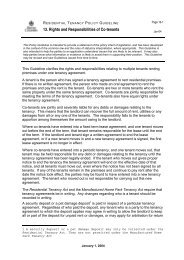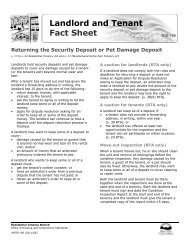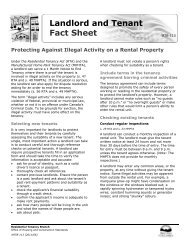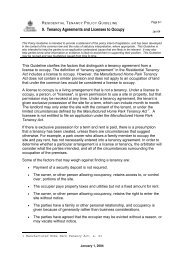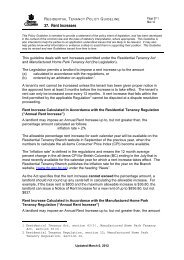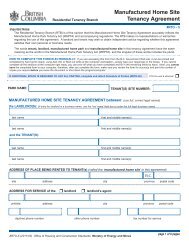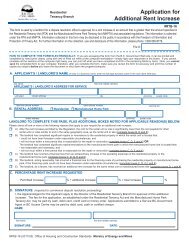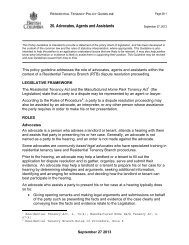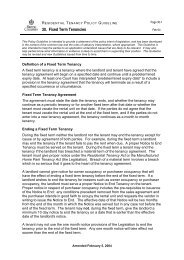3. Claims for Rent and Damages for Loss of Rent - Residential ...
3. Claims for Rent and Damages for Loss of Rent - Residential ...
3. Claims for Rent and Damages for Loss of Rent - Residential ...
Create successful ePaper yourself
Turn your PDF publications into a flip-book with our unique Google optimized e-Paper software.
RESIDENTIAL TENANCY POLICY GUIDELINE Page 3-1<br />
<strong>3.</strong> <strong>Claims</strong> <strong>for</strong> <strong>Rent</strong> <strong>and</strong> <strong>Damages</strong> <strong>for</strong> <strong>Loss</strong> <strong>of</strong> <strong>Rent</strong><br />
Jun-04<br />
This Policy Guideline is intended to provide a statement <strong>of</strong> the policy intent <strong>of</strong> legislation, <strong>and</strong> has been developed<br />
in the context <strong>of</strong> the common law <strong>and</strong> the rules <strong>of</strong> statutory interpretation, where appropriate. This Guideline is<br />
also intended to help the parties to an application underst<strong>and</strong> issues that are likely to be relevant. It may also<br />
help parties know what in<strong>for</strong>mation or evidence is likely to assist them in supporting their position. This Guideline<br />
may be revised <strong>and</strong> new Guidelines issued from time to time.<br />
This guideline deals with situations where a l<strong>and</strong>lord seeks to hold a tenant liable <strong>for</strong> loss<br />
<strong>of</strong> rent after the end <strong>of</strong> a tenancy agreement.<br />
Section 44 <strong>of</strong> the <strong>Residential</strong> Tenancy Act <strong>and</strong> section 37 <strong>of</strong> the Manufactured Home Park<br />
Tenancy Act set out when a tenancy agreement will end. A tenant is not liable to pay rent<br />
after a tenancy agreement has ended pursuant to these provision, however if a tenant<br />
remains in possession <strong>of</strong> the premises (overholds), the tenant will be liable to pay<br />
occupation rent on a per diem basis until the l<strong>and</strong>lord recovers possession <strong>of</strong> the<br />
premises. In certain circumstances, a tenant may be liable to compensate a l<strong>and</strong>lord <strong>for</strong><br />
loss <strong>of</strong> rent.<br />
Where a tenant has fundamentally breached the tenancy agreement or ab<strong>and</strong>oned the<br />
premises, the l<strong>and</strong>lord has two options. These are:<br />
1. Accept the end <strong>of</strong> the tenancy with the right to sue <strong>for</strong> unpaid rent to the date <strong>of</strong><br />
ab<strong>and</strong>onment;<br />
2. Accept the ab<strong>and</strong>onment or end the tenancy, with notice to the tenant <strong>of</strong> an intention<br />
to claim damages <strong>for</strong> loss <strong>of</strong> rent <strong>for</strong> the remainder <strong>of</strong> the term <strong>of</strong> the tenancy.<br />
These principles apply to residential tenancies <strong>and</strong> to cases where the l<strong>and</strong>lord has<br />
elected to end a tenancy as a result <strong>of</strong> fundamental breaches by the tenant <strong>of</strong> the Act or<br />
tenancy agreement. Whether or not the breach is fundamental depends on the<br />
circumstances but as a general rule non-payment <strong>of</strong> rent is considered to be a<br />
fundamental breach.<br />
If the l<strong>and</strong>lord elects to end the tenancy <strong>and</strong> sue the tenant <strong>for</strong> loss <strong>of</strong> rent over the<br />
balance <strong>of</strong> the term <strong>of</strong> the tenancy, the tenant must be put on notice that the l<strong>and</strong>lord<br />
intends to make such a claim. Ideally this should be done at the time the notice to end<br />
the tenancy agreement is given to the tenant. The filing <strong>of</strong> a claim <strong>for</strong> damages <strong>for</strong> loss <strong>of</strong><br />
rent <strong>and</strong> service <strong>of</strong> the claim upon the tenant while the tenant remains in possession <strong>of</strong><br />
the premises is sufficient notice. Filing <strong>of</strong> a claim <strong>and</strong> service upon the tenant after the<br />
tenant has vacated may or may not be found to be sufficient notice, depending on the<br />
circumstances. Factors which the arbitrator may consider include, but are not limited to,<br />
the length <strong>of</strong> time since the end <strong>of</strong> the tenancy, whether or not the tenant’s whereabouts<br />
was known to the l<strong>and</strong>lord <strong>and</strong> whether there had been any prejudice to the tenant as a<br />
result <strong>of</strong> the passage <strong>of</strong> time. The l<strong>and</strong>lord may also put the tenant on notice <strong>of</strong> the intent<br />
to make a claim <strong>of</strong> that nature by way <strong>of</strong> a term in the tenancy agreement. However,<br />
where a tenant has ab<strong>and</strong>oned the premises <strong>and</strong> the tenancy has ended with the<br />
ab<strong>and</strong>onment, notice must only be given within a reasonable time after the l<strong>and</strong>lord<br />
becomes aware <strong>of</strong> the ab<strong>and</strong>onment <strong>and</strong> is in a position to serve the tenant with the<br />
notice or claim <strong>for</strong> damages.<br />
The damages awarded are an amount sufficient to put the l<strong>and</strong>lord in the same position<br />
Amended June 29, 2004
RESIDENTIAL TENANCY POLICY GUIDELINE Page 3-2<br />
<strong>3.</strong> <strong>Claims</strong> <strong>for</strong> <strong>Rent</strong> <strong>and</strong> <strong>Damages</strong> <strong>for</strong> <strong>Loss</strong> <strong>of</strong> <strong>Rent</strong><br />
Jun-04<br />
as if the tenant had not breached the agreement. As a general rule this includes<br />
compensating the l<strong>and</strong>lord <strong>for</strong> any loss <strong>of</strong> rent up to the earliest time that the tenant could<br />
legally have ended the tenancy. This may include compensating the l<strong>and</strong>lord <strong>for</strong> the<br />
difference between what he would have received from the defaulting tenant <strong>and</strong> what he<br />
was able to re-rent the premises <strong>for</strong> the balance <strong>of</strong> the un-expired term <strong>of</strong> the tenancy.<br />
For example, a tenant has agreed to rent premises <strong>for</strong> a fixed term <strong>of</strong> 12 months at rent <strong>of</strong><br />
$1000.00 per month ab<strong>and</strong>ons the premises in the middle <strong>of</strong> the second month, not<br />
paying rent <strong>for</strong> that month. The l<strong>and</strong>lord is able to re-rent the premises from the first <strong>of</strong><br />
the next month but only at $50.00 per month less. The l<strong>and</strong>lord would be able to recover<br />
the unpaid rent <strong>for</strong> the month the premises were ab<strong>and</strong>oned <strong>and</strong> the $50.00 difference<br />
over the remaining 10 months <strong>of</strong> the original term. In a month to month tenancy, if the<br />
tenancy is ended by the l<strong>and</strong>lord <strong>for</strong> non-payment <strong>of</strong> rent, the l<strong>and</strong>lord may recover any<br />
loss <strong>of</strong> rent suffered <strong>for</strong> the next month as a notice given by the tenant during the month<br />
would not end the tenancy until the end <strong>of</strong> the subsequent month. If a month to month<br />
tenancy is ended <strong>for</strong> cause, even <strong>for</strong> a fundamental breach, there can be no claim <strong>for</strong> loss<br />
<strong>of</strong> rent <strong>for</strong> the subsequent month after the notice is effective, because a notice given by<br />
the tenant could have ended the tenancy at the same time.<br />
In all cases the l<strong>and</strong>lord’s claim is subject to the statutory duty to mitigate the loss by rerenting<br />
the premises at a reasonably economic rent. Attempting to re-rent the premises at<br />
a greatly increased rent will not constitute mitigation, nor will placing the property on the<br />
market <strong>for</strong> sale.<br />
Even if a l<strong>and</strong>lord is successful in re-renting the premises, a claim <strong>for</strong> loss <strong>of</strong> rent may still<br />
be successful where the l<strong>and</strong>lord has other vacancies <strong>and</strong> is able to establish that those<br />
other premises would have been rented had the tenancy in question continued.<br />
In a fixed term tenancy, if a l<strong>and</strong>lord is successful in re-renting the premises <strong>for</strong> a higher<br />
rent <strong>and</strong> as a result receives more rent over the remaining term than would otherwise<br />
have been received, the increased amount <strong>of</strong> rent is set <strong>of</strong>f against any other amounts<br />
owing to the l<strong>and</strong>lord <strong>for</strong> unpaid rent or damages, but any remainder is not recoverable by<br />
the tenant. In a month to month tenancy the fact that the l<strong>and</strong>lord may have been able to<br />
re-let the premises at a higher rent <strong>for</strong> a subsequent tenancy does not serve to reduce the<br />
liability <strong>of</strong> the previous tenant.<br />
Even where a tenancy has been ended by proper notice, if the premises are un-rentable<br />
due to damage caused by the tenant, the l<strong>and</strong>lord is entitled to claim damages <strong>for</strong> loss <strong>of</strong><br />
rent. The l<strong>and</strong>lord is required to mitigate the loss by completing the repairs in a timely<br />
manner.<br />
Amended June 29, 2004


